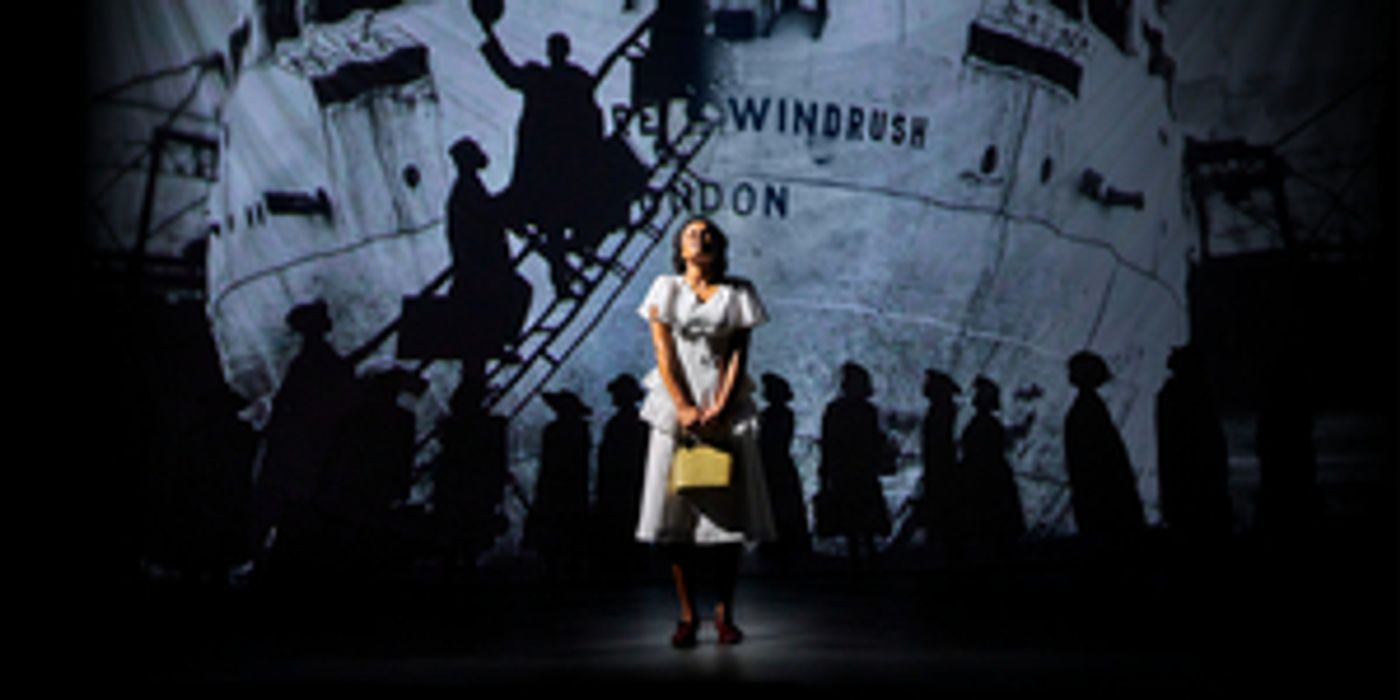Review: SMALL ISLAND, National Theatre At Home

![]() It could not have been better timing for the National Theatre to screen Small Island, Andrea Levy's epic and incredible story. This sellout 2019 production was due to return this autumn, but is now screened as part of the National Theatre At Home series.
It could not have been better timing for the National Theatre to screen Small Island, Andrea Levy's epic and incredible story. This sellout 2019 production was due to return this autumn, but is now screened as part of the National Theatre At Home series.
Levy never got to see how her novel translated so powerfully onto the stage as she sadly died just before rehearsals started. Her 2004 book is poignant, moving and warm, and the themes of love, racism and prejudice set among the Windrush generation could hardly feel more prescient. Helen Edmundson's adaptation is faithful to these qualities and creates an epic of a production.
Queenie longs to escape the Lincolnshire countryside - first working for her aunt, and then marrying awkward and emotionally stunted Bernard. In Jamaica, orphaned Hortense grows up with her 'cousin' Michael's family, falling in love with him and devastated when he leaves for England to enlist.
Bernard also enlists and then fails to come home after the war. In an effort to survive her impossible circumstances, Queenie begins to take in lodgers - black immigrants who find every other lodging closed to them. It is here that she meets Michael.
Meanwhile, hopeful Hortense wishes to make a better life away from her home in Jamaica. She makes a pact to marry genial Gilbert so they can travel to England together. While living at Queenie's house, Bernard unexpectedly comes home and everything changes.
It is through Gilbert's experiences that we see the brutality and cruelty of the prejudices that his generation of immigrants suffered. The hope and admiration that the immigrants hold for Britain before they face the cold reality of abject racism and poverty is crushing to watch. Gilbert wants to be a lawyer and Hortense a teacher, but both professions are denied to them due to social injustices.
There is not a weak link in the entire cast. Leah Harvey is beautifully pinched and prim as Hortense, convinced that Britain is a land of gentility and prosperity. Her sharpness and cruel side is exposed well, with her painful betrayal of her friend Celia (an excellent Shiloh Coke) to her utter incomprehension at being called a 'darkie' as she believes her lighter skin affords her a different reception. Harvey is poised, very dignified and completely believable.
Aisling Loftus is simply wonderful as Queenie, quick to settle for the first man to take an interest in her so she can escape the provincial life of her Lincolnshire family of butchers. Loftus creates a character brimming with bravery, practicality and resilience, as well as showing heartbreaking realism in her own life and future.
Andrew Rothney is so buttoned-up as Queenie's husband Bernard, the whole stage feels stiff and formal when he is on it. We see the trauma of his wartime experience and the impact on his soul, but his bigotry is so stark that it is very hard to sympathise with him in any way.
Gershwyn Eustache Jr is incredibly likeable as Gilbert, faced with crippling prejudice and yet yearning to simply work hard and make a better life. He creates a character the audience can completely empathise with and respect.
Even on the small screen, this production feels incredibly cinematic, with Jon Driscoll's projections taking full advantage of the size of the Olivier stage. The huge cinema screen with the on-stage audience's backs to the real audience is particularly effective, although the scale of the images of the Windrush and London lose some impact through the screening. Designer Katrina Lindsay manages to make the domestic scenes feel very intimate, and these are the moments that work best watching at home.
Rufus Norris's direction is slick and carefully thought out. While there are clearly very serious themes at play here, this production is also very funny, with wonderfully visual comedy that never veers into slapstick.
At just under three hours, the production could have been trimmed in places, but overall the slower pace feels suitable to enable immersion into the characters and their lives. It feels very human, poignant and important, using the past to create an important narrative very much for today. Essential viewing.
Small Island is available on The National Theatre's YouTube Channel until 25 June
Photo Credit: Brinkoff-Moegenburg
Reader Reviews
Videos


